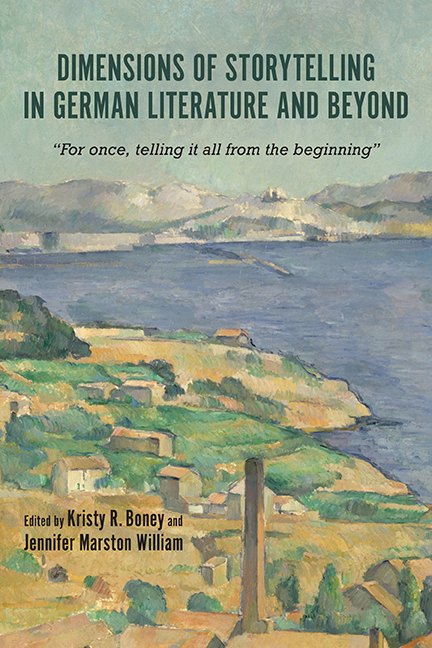 Dimensions of Storytelling in German Literature and Beyond
Dimensions of Storytelling in German Literature and Beyond Book contents
- Frontmatter
- Contents
- Acknowledgments
- Introduction: The Social, Political, and Personal Dimensions of Storytelling
- Part I Anna Seghers: A Missing Piece in the Canon of Modernist Storytellers
- 1 Anna Seghers in Heidelberg: The Formative Years
- 2 Who Is the Narrator? Anna Seghers's “The Excursion of the Dead Girls”: Narrative Mode and Cinematic Depiction
- 3 Anna Seghers's Rubble Literature, 1947–49
- 4 Anna Seghers and the Struggle to Tell Stories about the Nazi Past in the Early German Democratic Republic
- 5 Aufbauzeit or flaue Zeit? Anna Seghers's GDR Novels
- 6 The Time of Decision in Anna Seghers
- 7 Filling the Void with Stories: Anna Seghers's Conceptual Metaphors
- Part II Expressions of Modernity: Using Storytelling Unconventionally
- Part III The Personal Narrative: Storytelling in Acute Historical Moments
- Notes on the Contributors
- Index
5 - Aufbauzeit or flaue Zeit? Anna Seghers's GDR Novels
from Part I - Anna Seghers: A Missing Piece in the Canon of Modernist Storytellers
Published online by Cambridge University Press: 12 April 2019
- Frontmatter
- Contents
- Acknowledgments
- Introduction: The Social, Political, and Personal Dimensions of Storytelling
- Part I Anna Seghers: A Missing Piece in the Canon of Modernist Storytellers
- 1 Anna Seghers in Heidelberg: The Formative Years
- 2 Who Is the Narrator? Anna Seghers's “The Excursion of the Dead Girls”: Narrative Mode and Cinematic Depiction
- 3 Anna Seghers's Rubble Literature, 1947–49
- 4 Anna Seghers and the Struggle to Tell Stories about the Nazi Past in the Early German Democratic Republic
- 5 Aufbauzeit or flaue Zeit? Anna Seghers's GDR Novels
- 6 The Time of Decision in Anna Seghers
- 7 Filling the Void with Stories: Anna Seghers's Conceptual Metaphors
- Part II Expressions of Modernity: Using Storytelling Unconventionally
- Part III The Personal Narrative: Storytelling in Acute Historical Moments
- Notes on the Contributors
- Index
Summary
IN THIS CHAPTER I explore socialism as a problem of narrative and emplotment in Anna Seghers's late novels, Die Entscheidung (The Decision, 1959) and Das Vertrauen (Trust, 1968), which together are formal experiments in an open epic form that grasps East German socialism in its essentially worldly character and nonsynchronous temporal dimensions, while at the same time providing a model for a the novel genre as a form of cognitive mapping in a moment of far-reaching social crisis and transformation. Without drawing a blanket homology between economic plan and literary plot, or making any claim that there is something political or socialist about the process of literary emplotment per se, I argue that plot is a problem for epic narratives that seek to depict socialism as an emergent life world, raising questions about both narrative causality and historical agency. Seghers's work is unique within the corpus of German socialist realism in explicitly thematizing this problem, but less in the form of political didacticism than through the representation of necessity and contingency in the text as an explicit exploration of the organizing capacity of emplotment. The historical adequacy of narrative in Seghers's work consists in successfully bringing the collective dimension of being and acting into visibility. This collective capacity in Seghers's narratives should not be understood in terms of the effacement of individual experiences into some sort of totalitarian unity, but rather as a mode of third-person mediation that allows for the preservation, transmission, and coordination of experience and agency between subjects across space and time; it is, in short, a plan. Seghers reminds us in her 1973 address to the Eighth Writers’ Congress of the GDR, “socialism does not mean a narrowing, but always an expansion of the field of vision, because I have chosen a standpoint from which I can see the furthest in any direction.”
In this essay I take Die Entscheidung and Das Vertrauen as test cases for this socialist narrative perspective, and I will attend to both what Seghers's late novel structure makes possible and where it finds its limits; as though Seghers had formally solved a problem that history itself had yet to resolve.
- Type
- Chapter
- Information
- Dimensions of Storytelling in German Literature and Beyond“For once, telling it all from the beginning”, pp. 70 - 81Publisher: Boydell & BrewerPrint publication year: 2018
- 2
- Cited by
